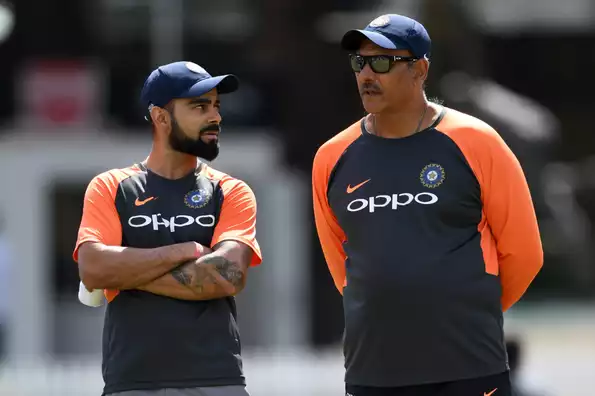Former India head coach Ravi Shastri stated that his former captain’s choice wasn’t merely a gut feeling a few days after Virat Kohli abruptly retired from Test cricket. As one of the most successful captain-coach combinations in Indian history, Shastri and Kohli have a strong relationship that extends beyond their work life.
The sixty-two-year-old spoke about the recent talk he had with Kohli. Shastri, like many others around the world, anticipated that the star batter would extend his career, but he also explains how Kohli’s responses persuaded him.
“I did speak to him about it, I think a week before that [his announcement] and his mind was very clear that he’d given his everything,” Shastri said while speaking in The ICC Review
The 36-year-old was suffering from a prolonged slump in the game’s longest format when he announced his retirement. Kohli’s batting average had fallen since 2020, finishing just a bit above 46, which was shocking for a top batsman who used to average in the high 50s. Kohli has batted 65 times in Test matches since December 2020, averaging a pitiful 32.09 with only three hundreds and nine fifties in this time frame.
In addition to the sharp decline in batting results, Shastri believes that Kohli’s aggressive style of play would have worn him down. It is a significant accomplishment for a player to simply appear in 68 Test matches, but for Kohli, it is the amount of games he captained, winning 40 of them to become India’s most successful Test captain. The amount of labor and Kohli’s intensity as a player-captain may have destroyed him despite all the success.
“If he decided to do something, then he gave his 100%, which is not easy to match,” Shastri said. “Individually, as a bowler, as a batsman. A player does his job, [and] then you sit back. But [with Kohli] when the team goes out, it’s as if he has to take all the wickets, he has to take all the catches, he has to make all the decisions on the field.
“That much involvement, I would think there’s going to be a burnout somewhere if he doesn’t take a rest, if he doesn’t compartmentalise how much he wants to play across formats, there is bound to be a burnout.”
Although he could see the rationale behind Kohli’s departure, Shastri had a completely different viewpoint. Because of this, Shastri’s decision to resign was just as uncertain as it was for everyone else.
“Virat surprised me because I thought he had at least two-three years of Test match cricket left in him,” he said. “But then, when you’re mentally fried and overcooked, that’s what tells your body. You might be physically the fittest guy in the business. You might be fitter than half the guys in your team, but mentally when you’re well done, as they say, then it sends a message to the body. You know, that’s it.”
Shastri gushed about Kohli’s superstar persona and thinks that his tactics elevated Test cricket to a spectacular event. The longest format of cricket has had survival issues since T20 cricket became popular worldwide, but Kohli handled it with respect and maintained Test cricket’s position as the best. This was made possible in large part by his aggressive tactics and body language as captain. So did Kohli’s character.
“He’s got accolades around the globe. He has a bigger following than any other cricketer in the last decade,” Shastri said. “Whether it’s Australia, whether it’s South Africa, he just got people to watch the game. There was a love-hate relationship.
“They would get angry because he had the ability to get under the skin of the viewer also. In the way he celebrated, his intensity was such that it was rash. It spread very quickly, not just within the dressing room, but within living rooms as well for people watching cricket. So he was an infectious personality.”















